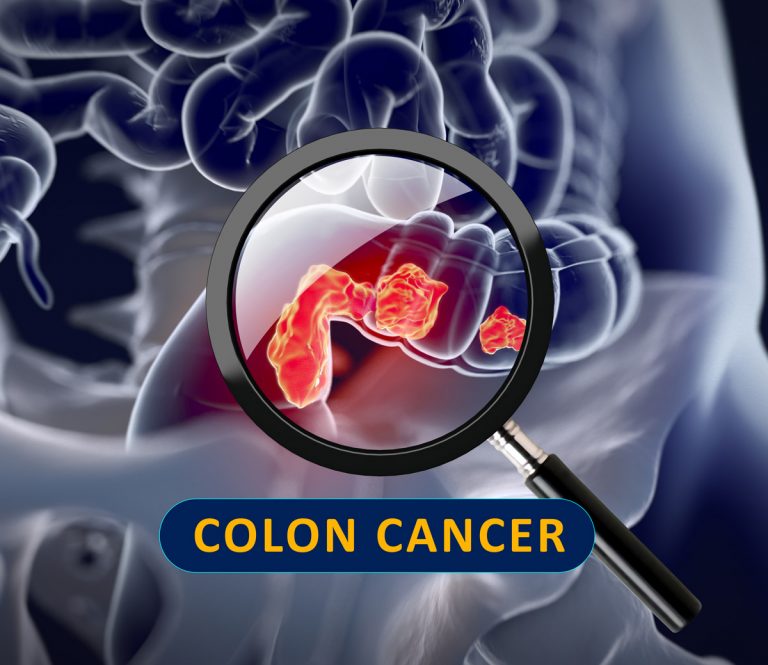Colorectal cancer is the third most commonly diagnosed cancer, not including skin cancer, and the second leading cause of death in both men and women combined.
Colorectal cancer arises from the inner lining of the large intestine, also known as mucosa. It usually begins as an abnormal growth, or polyp, that forms in the colon or rectum. Symptoms typically don’t present early and show up as the disease progresses.
An increase in screening and change of lifestyle-related risk behaviors has led to a decrease in the number of new colorectal cancer cases and the number of deaths from colorectal cancer.
In 2018 the U.S. Preventative Task Force (USPSTF) and American Cancer Society lowered the age for initiation of screening to 45 years old. However, those with increased risk, such as those with a family history of colon cancer should consider screening sooner.
The Colon Cancer Prevention Program (CCPD) at the UConn Health Carole and Ray Neag Comprehensive Cancer Center is a unique clinical and basic science integration focusing on patients at increased risk for colon cancer. This includes those with a positive family history and or a personal history of at-risk colon polyps.
At UConn, your cancer prevention plan begins with a detailed assessment to help determine your unique risk factors. At your first appointment, our nurse practitioner, doctors, and other team leaders will start working with you to create your personal risk-reduction strategies.
Several screening options exist including stool tests, flexible sigmoidoscopy, and colonoscopy.
CCPP had introduced the quantitative FIT test measuring immune hemoglobin in stool at billionths of a gram. In addition, tests for Stool DNA, also known as Cologuard, are additionally used for non-invasive detection of advanced polyps or cancer. Colonoscopy remains a key screening modality and its use is modified by both the patient risk profile and the risk associated with any specific polyp. Fortunately, most colon polyps do not convey a marked increase in long-term risk. The frequency of the colon exam is determined by the combination of patient risk factors and the findings on the colon exam.
A colonoscopy is the best available tool to allow physicians to visualize the entire large intestine and look for the earliest signs of cancer. Experts with the CCPP at UConn Health use a more advanced system to visualize even the smallest blood vessels within the colon. UConn’s system can magnify segments of tissue and blood vessels allowing experts to see the tiniest changes in the colon years, or even decades before these changes could lead to dangerous polyps.
While in many cases, there are no obvious symptoms with colon cancer, there are some that can be warning signs and should be discussed with your physician. These include:
• Any major change in bowel habits
• Blood in the stool that is either bright red, black, or tarry
• Unintentional weight loss
• Stools that are narrower than usual
• Diarrhea, constipation, or feeling that the bowel does not empty completely
• General abdominal discomfort, such as frequent gas pains, bloating, fullness, and/or cramps
• Constant feeling of fatigue or tiredness
• New onset anemia diagnosed on routine lab work
“Defining the causes and risk factors for early-onset colorectal cancer will likely help inform approaches for prevention, screening, and treatment,” says Dr. Joel Levine, co-director and founding director, Colon Cancer Prevention Program at UConn Health.
Factors that may increase your risk of colon cancer include:
- Older age
- African-American race
- Obesity
- Diabetes
- A personal history of colorectal cancer or polyps.
- Inflammatory intestinal conditions
- Inherited syndromes that increase colon cancer risk
- Family history of colon cancer
- Low-fiber, high-fat diet
- A sedentary lifestyle
Only about 3% of patients with a family history of colon cancer have inherited risk due to a mutated gene passed along the generations. UConn Health has an expert Genetics service that provides both testing and counseling for such patients or families. Most people with a family history share risk factors among family members so improving the lifestyle lowers risk over time.
You can take steps to reduce your risk of colon cancer by making changes in your everyday life:
- Eat a variety of fruits, vegetables, and whole grains. Fruits, vegetables, and whole grains contain vitamins, minerals, fiber, and antioxidants, which may play a role in cancer prevention. Choose a variety of fruits and vegetables so that you get an array of vitamins and nutrients.
- Drink alcohol in moderation, if at all. If you choose to drink alcohol, limit the amount of alcohol you drink to no more than one drink a day for women and two for men.
- Stop smoking. Talk to your doctor about ways to quit that may work for you.
- Exercise most days of the week. Try to get at least 30 minutes of exercise on most days. If you’ve been inactive, start slowly and build up gradually to 30 minutes. Also, talk to your doctor before starting any exercise program.
- Maintain a healthy weight. If you are at a healthy weight, work to maintain your weight by combining a healthy diet with daily exercise. If you need to lose weight, ask your doctor about healthy ways to achieve your goal. Aim to lose weight slowly by increasing the amount of exercise you get and reducing the number of calories you eat.
Please see a doctor if you are concerned about colon cancer symptoms, preferably sooner if you have a family history of the disease. Acting quickly can potentially save your life.
If you are concerned about colon cancer or are seeking more information visit the Carole and Ray Neag Cancer Center or the Colon Cancer Prevention Program.



